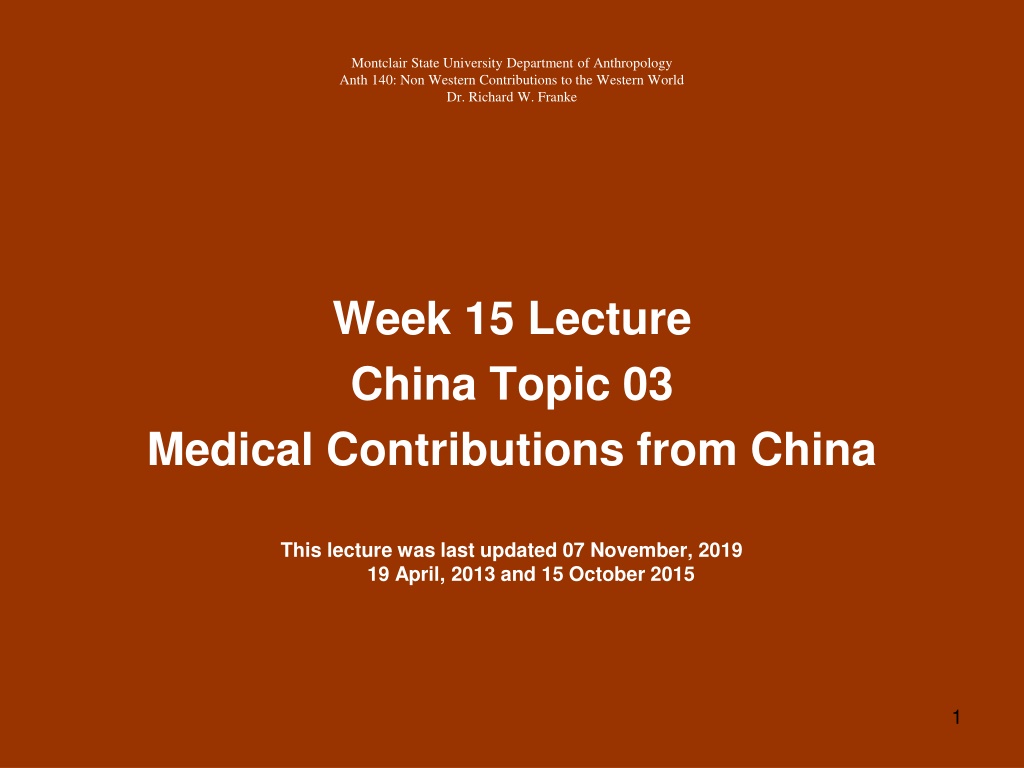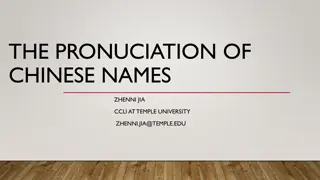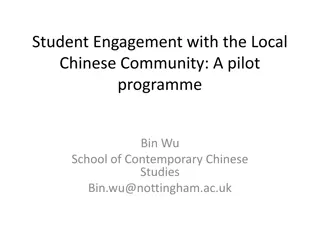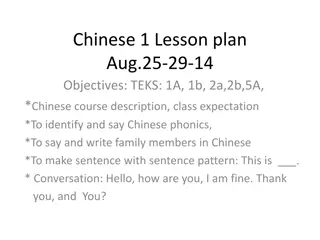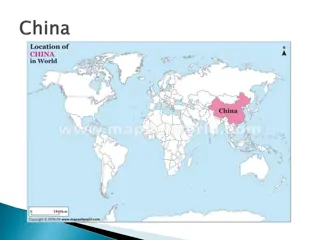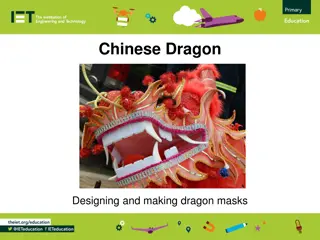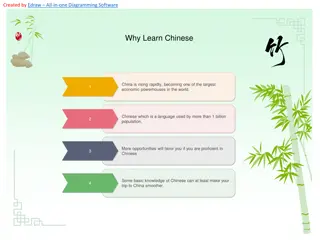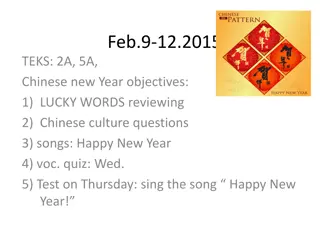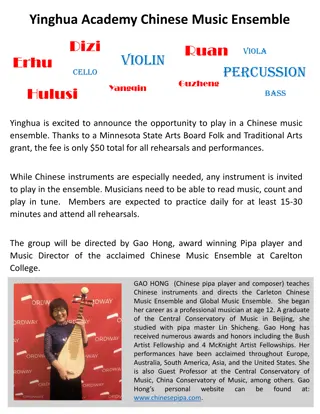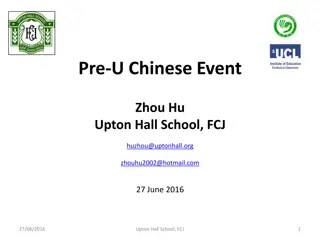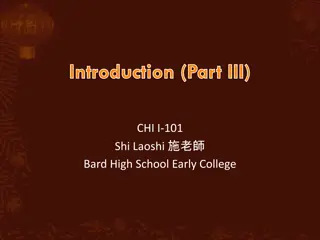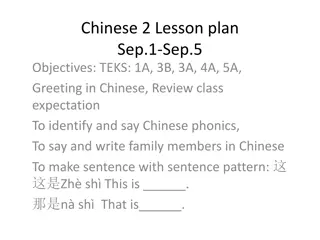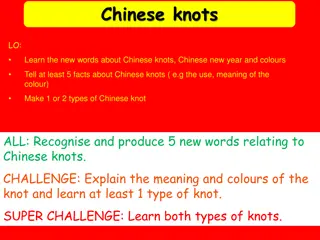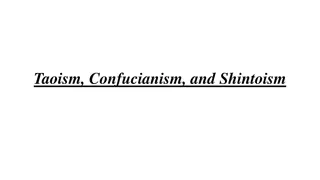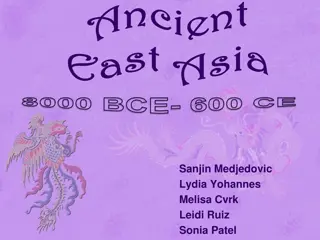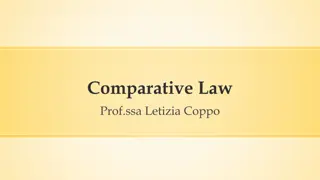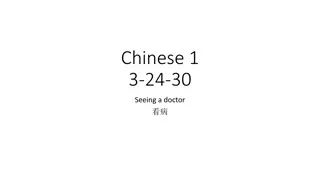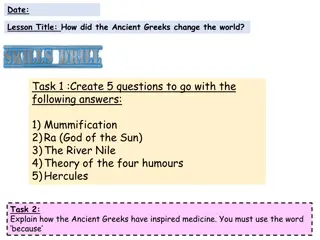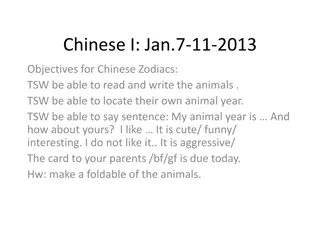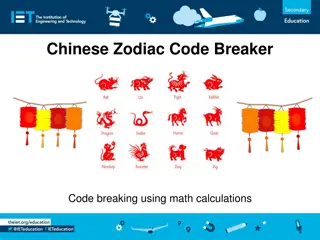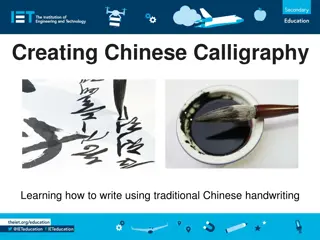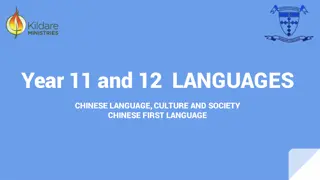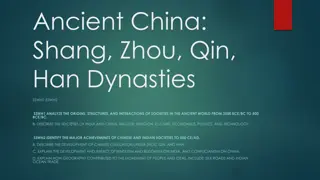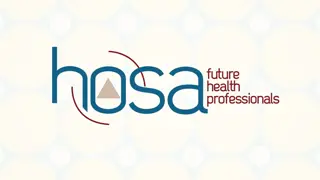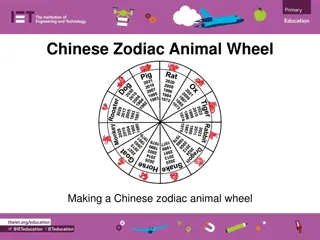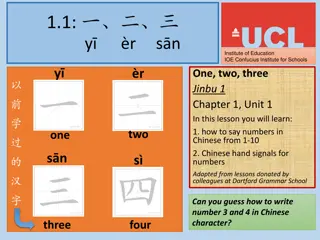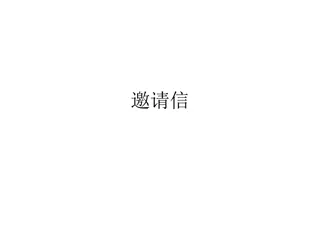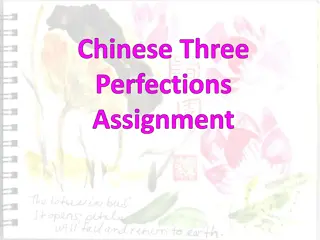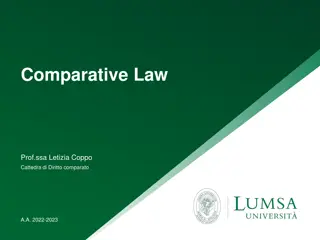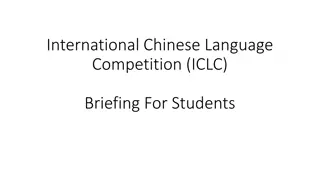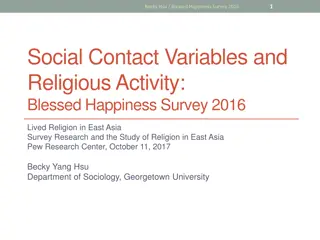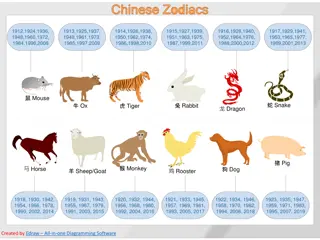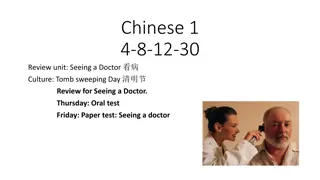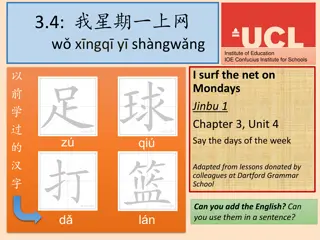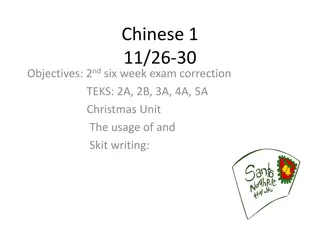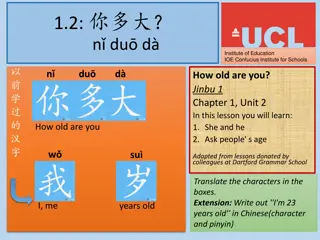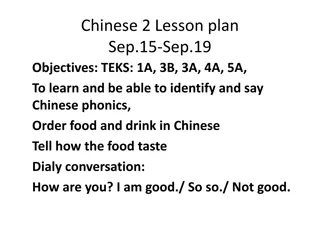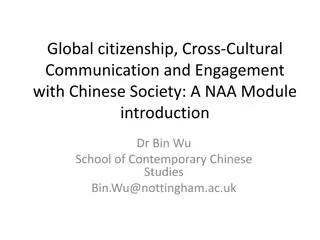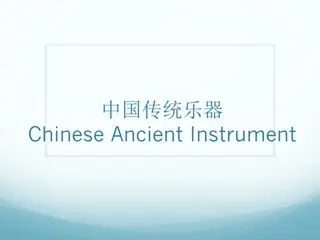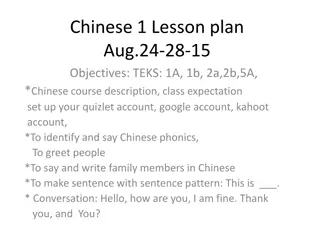Ancient Chinese Medical Contributions to the World
China has made significant contributions to global health and medicine, including the discovery of circadian rhythms, smallpox vaccination, and acupuncture. These advancements play a crucial role in both historical and contemporary healthcare practices worldwide. The learning objectives and key terms associated with China's medical gifts are outlined, supplemented by recommended readings and additional sources.
Download Presentation

Please find below an Image/Link to download the presentation.
The content on the website is provided AS IS for your information and personal use only. It may not be sold, licensed, or shared on other websites without obtaining consent from the author. Download presentation by click this link. If you encounter any issues during the download, it is possible that the publisher has removed the file from their server.
E N D
Presentation Transcript
Montclair State University Department of Anthropology Anth 140: Non Western Contributions to the Western World Dr. Richard W. Franke Week 15 Lecture China Topic 03 Medical Contributions from China This lecture was last updated 07 November, 2019 19 April, 2013 and 15 October 2015 1
Montclair State University Department of Anthropology Anth 140: Non Western Contributions to the Western World Dr. Richard W. Franke Medical Contributions from China The learning objectives for week 15 are: to know a few of China s major medical gifts to the world including the discovery of circadian rhythms, smallpox vaccination and acupuncture to appreciate the role of Chinese medicine in world history and in the world today 2
Montclair State University Department of Anthropology Anth 140: Non Western Contributions to the Western World Dr. Richard W. Franke Medical Contributions from China Terms you should know for week 15 are: chi yin yang circadian rhythms acupuncture 3
Montclair State University Department of Anthropology Anth 140: Non Western Contributions to the Western World Dr. Richard W. Franke These slides correspond to and supplement the reading: Robert Temple. 1998. The Genius of China: 3,000 Years of Science, Discovery and Invention. London: Prion Books Limited. Chapter 5, Medicine and Health, pp. 123 37 Note on the reading: This book has been reprinted several times. If the page numbers above do not correspond to your book, use the Part number or topic title to guide your reading. This slide was updated on 25 Nov 2013 4
Montclair State University Department of Anthropology Anth 140: Non Western Contributions to the Western World Dr. Richard W. Franke Medical Contributions from China Additional Sources: James, Peter, and Thorpe, Nick. 1994. Ancient Inventions. Esp. pages 42 47; Needham, Joseph. 1981. Science in Traditional China: A Comparative Perspective. Cambridge, MA: Harvard University Press. Esp. pages 85 106. Panati, Charles. 1987. Panati's Extraordinary Origins of Everyday Things. New York: Harper and Row. Rosen, Samuel. 1971. I have seen the past and it works. The New York Times. Walln fer, Heinrich, and Anna von Rottauscher. 1972. Chinese Folk Medicine. New York: Mentor Books. 5
Montclair State University Department of Anthropology Anth 140: Non Western Contributions to the Western World Dr. Richard W. Franke 1. China gave substantial health and medical contributions to the world 2. Many only recently being recognized 6
Montclair State University Department of Anthropology Anth 140: Non Western Contributions to the Western World Dr. Richard W. Franke 3. Circulation of the blood 2nd century BC William Harvey official discoverer in 1628 Got idea from Italian doctors who read al-Nafis of Damascus (d 1288) Al-Nafis learned it from Chinese 7
Montclair State University Department of Anthropology Anth 140: Non Western Contributions to the Western World Dr. Richard W. Franke 4. Chinese theory of two fluids in body Blood (yin) pumped by heart flows thru arteries, veins and capillaries Ch i (yang), a form of energy pumped by lungs thru invisible tracts (see later under acupuncture) 5. Recognized 28 types of pulses Chinese medicine today relies heavily on comparative pulse taking 8
Montclair State University Department of Anthropology Anth 140: Non Western Contributions to the Western World Dr. Richard W. Franke 5a. Chi (sometimes spelled Ch i) in Chinese thought is a general energy flow found throughout nature and throughout the universe. In Western philosophy this kind of belief is called by the name vitalism. 9
Montclair State University Department of Anthropology Anth 140: Non Western Contributions to the Western World Dr. Richard W. Franke 6. Attempted to calculate speed of blood flow but got it wrong by 60 times too slow; 28.8 minutes versus correct time of 30 seconds for complete circulation 7. Use bellows and bamboo tubes to simulate and study blood flow 10
Montclair State University Department of Anthropology Anth 140: Non Western Contributions to the Western World Dr. Richard W. Franke 8. Circadian rhythms By the 2nd century BC Chinese physicians had observed certain biological clocks that influence people's general feelings and also the intensity of symptoms of certain diseases asthma patients, for example, suffer more at night when adrenal secretions are least. Pain levels also vary greatly during the day. Fevers and body temperatures increase toward evening 11
Montclair State University Department of Anthropology Anth 140: Non Western Contributions to the Western World Dr. Richard W. Franke 9. Acupuncture see later in slides was attuned to circadian rhythms as Chinese physicians understood them 10. Circadian rhythms still not well understood by Western medicine 12
Montclair State University Department of Anthropology Anth 140: Non Western Contributions to the Western World Dr. Richard W. Franke 11. Endocrinology 2nd century BC isolated sex and pituitary hormones Used for diseases and for overcoming sterility Hormone crystals extracted from human urine Understood difference between androgens and estrogens 13
Montclair State University Department of Anthropology Anth 140: Non Western Contributions to the Western World Dr. Richard W. Franke 12. Deficiency diseases Known by at least 200 AD Han Y (762 824) noticed contrasting incidence of beriberi south and north of Yangtze river This an early example of epidemiology Hu Ssu-Hui between 1314 and 1330 The Principles of Correct Diet First book to systematize dietary advice for health 14
Montclair State University Department of Anthropology Anth 140: Non Western Contributions to the Western World Dr. Richard W. Franke 13. Diabetes 2nd century BC had noticed excessive thirst associated with diabetes Realized eating of sweets could be connected 7th century AD realized excessive sugar in urine was part of the disease s etiology China about 1,000 years ahead of West in understanding diabetes 15
Montclair State University Department of Anthropology Anth 140: Non Western Contributions to the Western World Dr. Richard W. Franke 14. Goiter and thyroid problems 7th century AD Chinese understood basics Knew that seaweed could reduce problems China about 2,500 years ahead of West 16
Montclair State University Department of Anthropology Anth 140: Non Western Contributions to the Western World Dr. Richard W. Franke 15. Immunology Smallpox inoculation known by 10th century AD May have influenced or been influenced by African practices see week 09 lecture 02 Is known to have spread to Turkey then to West Chinese kept innoculum for month before using led to heat death of 80% of virus particles 17
Montclair State University Department of Anthropology Anth 140: Non Western Contributions to the Western World Dr. Richard W. Franke 16. Steroids and Antibodies Steroids reduce swellings and inflammation Antibodies identify and kill infectious diseases Both were possibly developed by Chinese Sources: Temple, Robert. 1986. The Genius of China: 3,000 Years of Science, Discovery, and Invention. New York. Simon and Schuster. Pages 123-137. Needham, Joseph. 1981. Science in Traditional China: a Comparative Perspective. Cambridge, Mass. Harvard University Press. Pages 85-106. 18
Montclair State University Department of Anthropology Anth 140: Non Western Contributions to the Western World Dr. Richard W. Franke 17. Ancient Chinese Medical Theory The Nei Ching: the Book of Internal Medicine 1,000 BC may be the oldest medical text known. Even by 1,000 BC it was a well-known compilation of medical ideas on which many commentaries had been written. [NB: Edwin Smith Egyptian text is 1,600 BC see week 07 lecture 03] 19
Montclair State University Department of Anthropology Anth 140: Non Western Contributions to the Western World Dr. Richard W. Franke 18. The Nei Ching: A fairly accurate understanding of the circulation system, including the difference between veins and arteries; An interpretation of the vein/artery distinction in terms of yin, the negative (oxygen-starved veins) and yang, the positive (oxygen-rich arteries), terms that permeate Chinese medical and philosophical thought. 20
Montclair State University Department of Anthropology Anth 140: Non Western Contributions to the Western World Dr. Richard W. Franke A basic idea about the function of nerves. A theory about the causes of fever: too much yang outbalancing the yin, and prescriptions for life style and medicine intake to avoid fever. Too much yin causes the pulse to weaken. Descriptions of several types of pulse beats and theories about what they mean and how to cure them to bring them back to normal. 21
Montclair State University Department of Anthropology Anth 140: Non Western Contributions to the Western World Dr. Richard W. Franke 18a. Nei Ching continued A theory of 6 yin and 6 yang meridians, or ducts through the body that carry the two types of energy. At 365 places these ducts come to the surface of the body: insertion of one of 9 types of acupuncture needles at these emergence points can affect the balance of yin and yang thereby curing diseases or stopping pain. Western science still cannot account more effectively for the observed successes of acupuncture. Source: Wallin fer and Anna von Rottauscher. 1972. Chinese Folk Medicine. New York: Mentor Books. Pp. 16-17, 27-28, 126-127. 22
Montclair State University Department of Anthropology Anth 140: Non Western Contributions to the Western World Dr. Richard W. Franke 19. More on Chinese medicine .delivery of medical services 20. The Romans may have had the first public medical system around 200 BC in which local town councils paid the doctors who treated everyone otherwise for free. 23
Montclair State University Department of Anthropology Anth 140: Non Western Contributions to the Western World Dr. Richard W. Franke 21. The Chinese system was established by the second century BC and was financed by the central government rather than local communities. In establishing a national health care system that covered the entire population, China was about 2 thousand years ahead of Europe and Canada. 24
Montclair State University Department of Anthropology Anth 140: Non Western Contributions to the Western World Dr. Richard W. Franke 22. The United States has still not found a way to provide guaranteed health services to its entire population in December 2006 New Jersey Senate Democrat Joseph Vitale headed a study commission to make New Jersey the 4th state after Maine, Massachusetts and Vermont to guarantee health insurance to its entire population. 25
Montclair State University Department of Anthropology Anth 140: Non Western Contributions to the Western World Dr. Richard W. Franke 2013 Update 22a. This effort has not yet succeeded and the 2010 national Affordable Care Act ( Obamacare ) still leaves several million uninsured. If Republican governors carry out their threats to reject certain provisions of the Act, the poorest members of society will remain uncovered in those states. 26 This slide was added 19 April 2013
Montclair State University Department of Anthropology Anth 140: Non Western Contributions to the Western World Dr. Richard W. Franke 23. China s health services were backed up by medical schools where doctors were trained. The world s oldest known medical school is the University of Lo-yang in 493 AD. In India medical schools might be even older. 24. The world s first known hospital comes from China in 2 AD 27
Montclair State University Department of Anthropology Anth 140: Non Western Contributions to the Western World Dr. Richard W. Franke 25. It has been established that by 400 AD Chinese hospitals were being run by Buddhist charities as well as the government. These may have been the model for Christian charitable hospitals that began appearing in Europe around the same time. 26. During Roman times, doctors had clinics and nursing homes within their own house complexes 28
Montclair State University Department of Anthropology Anth 140: Non Western Contributions to the Western World Dr. Richard W. Franke 27. The first drug stores were set up by the Muslims in Baghdad in the 9th century Muslim science developed the branch called saydanah or pharmaceutical science Baghdad pharmacies were regulated by the government for quality control of medicines 28. European pharmacies were set up about 400 years later. 29
Montclair State University Department of Anthropology Anth 140: Non Western Contributions to the Western World Dr. Richard W. Franke Acupuncture 29. Acupuncture is probably China s most famous medical contribution 30. Acupuncture is widely accepted internationally as an effective treatment for several diseases and injuries 30
Montclair State University Department of Anthropology Anth 140: Non Western Contributions to the Western World Dr. Richard W. Franke Acupuncture 31. Acupuncture is the insertion and twisting of very fine needles at surface points on the human body. Since the 1960s, some needles have been charged with 6 to 12 volts of low-wattage DC current. 31
Montclair State University Department of Anthropology Anth 140: Non Western Contributions to the Western World Dr. Richard W. Franke Acupuncture 32. Moxibustion is the burning of small sticks of the Artemisia (mugwort) shrub on the skin at the acupuncture points 32
Montclair State University Department of Anthropology Anth 140: Non Western Contributions to the Western World Dr. Richard W. Franke Acupuncture Moxibustion can be done in connection with acupuncture Some theories say the patient is relaxed by inhaling the moxibustion smoke Photos show cigar moxas 33
Montclair State University Department of Anthropology Anth 140: Non Western Contributions to the Western World Dr. Richard W. Franke Acupuncture 33. Acupuncture and moxibustion were known in China from at least the 2nd century BC 34. Several recent Chinese emperors had banned both practices 34
Montclair State University Department of Anthropology Anth 140: Non Western Contributions to the Western World Dr. Richard W. Franke Acupuncture: 2013 Update 35. The communist government after 1949 made the revival of acupuncture and moxibustion a major part of its medical and public health campaigns 36. The addition of small electrical charges to the acupuncture needles was part of the discoveries made during the cultural revolution of 1966 to 1976. 35 This slide was updated 19 April 2013
Montclair State University Department of Anthropology Anth 140: Non Western Contributions to the Western World Dr. Richard W. Franke Acupuncture 37. Chinese physicians have now established among Western scientists their claim that acupuncture can relieve pain, kill infections, and treat asthma, migraines, ulcers, and drug addiction 38. The claim that acupuncture can cure depression and schizophrenia is currently under investigation worldwide 36
Montclair State University Department of Anthropology Anth 140: Non Western Contributions to the Western World Dr. Richard W. Franke Acupuncture 39. The United States National Institute of Health (NIH) states that as of 2002 it was estimated that 8.2 million adult Americans had tried acupuncture for a wide range of diseases and conditions. 40. The Food and Drug Administration approved acupuncture needles for use in the US in 1996. 37
Montclair State University Department of Anthropology Anth 140: Non Western Contributions to the Western World Dr. Richard W. Franke Acupuncture 41. Many health insurance plans now cover acupuncture for certain conditions. 42. Several major studies are underway to assess acupuncture s benefits. 43. Very few side effects have ever been associated with acupuncture 38
Montclair State University Department of Anthropology Anth 140: Non Western Contributions to the Western World Dr. Richard W. Franke Acupuncture 44. Among the uses of acupuncture reported to be successful or possibly successful by the US NIH: Reducing post-operative nausea and vomiting Curing or ameliorating Addiction Headache Menstrual cramps Tennis elbow 39
Montclair State University Department of Anthropology Anth 140: Non Western Contributions to the Western World Dr. Richard W. Franke Acupuncture 44a. Acupuncture possible benefits continued Myofascial pain Osteoarthritis Low-back pain Carpal tunnel syndrome Asthma Aiding in stroke recovery 40
Montclair State University Department of Anthropology Anth 140: Non Western Contributions to the Western World Dr. Richard W. Franke Acupuncture 44b. Acupuncture benefits continued Fibromyalgia (chronic pain throughout the body often associated with chronic fatigue syndrome) Pain relief in almost all types of pain 45. Chinese physicians use acupuncture as an anesthesia for major surgery 41
Montclair State University Department of Anthropology Anth 140: Non Western Contributions to the Western World Dr. Richard W. Franke Acupuncture 46. The Chinese theory behind acupuncture postulates 361 or 365 points on the body where channels carry the yin [spirit energy] and the yang [blood]. The needles release, restore, or drain energy or ch i so as to reestablish the proper balance within the body. Sources: James, Peter, and Thorpe, Nick. 1994. Ancient Inventions. Esp. pages 42 47; Needham, Joseph. 1981. Science in Traditional China: A Comparative Perspective. Cambridge, MA: Harvard University Press. Esp. pages 85 106. 42
Montclair State University Department of Anthropology Anth 140: Non Western Contributions to the Western World Dr. Richard W. Franke Acupuncture 47. Western medicine has still not developed a satisfactory explanation for the obvious and observed healing effects of acupuncture 43
Montclair State University Department of Anthropology Anth 140: Non Western Contributions to the Western World Dr. Richard W. Franke Acupuncture 48. Western scientists now realize that ancient Chinese physicians somehow developed an understanding of viscero- cutaneous reflexes. These are connections between diseases of certain internal organs and their telltale signs at pressure points on the skin 44
Montclair State University Department of Anthropology Anth 140: Non Western Contributions to the Western World Dr. Richard W. Franke Acupuncture 49. In Western medicine one such reflex is known as McBurney s point a place on the front of the body where appendicitis typically causes a pain point. 50. The Chinese theory is far more complex: four major systems include: 45
Montclair State University Department of Anthropology Anth 140: Non Western Contributions to the Western World Dr. Richard W. Franke Acupuncture tract to the hand (the cheirotelic tract) connects to the lungs tract from the hand connects to the large intestine tract to the foot connects to the gall bladder tract from the foot (podogenic) connects to the liver 46
Montclair State University Department of Anthropology Anth 140: Non Western Contributions to the Western World Dr. Richard W. Franke Acupuncture 51. Knowledge of these and several related systems tells the acupuncturist where to insert the needle 52. One theory is based on the natural childbirth methods developed in the Soviet Union in the 1920s and based on the research of Ivan Pavlov 47
Montclair State University Department of Anthropology Anth 140: Non Western Contributions to the Western World Dr. Richard W. Franke Acupuncture 53. Just as the woman s breathing exercises are supposed to interfere with the transmission of pain from the birth canal to the brain 54. So the twisting needle might block the transmission of pain to the brain from wherever it is originating. 48
Montclair State University Department of Anthropology Anth 140: Non Western Contributions to the Western World Dr. Richard W. Franke Acupuncture 55. A modern version of this is the gate theory of pain, developed by Ronald Melzack, McGill University psychologist, in 1965 56. Certain nerve fibers block the transmission of pain while others facilitate it: the two systems meet at the spinal chord 49
Montclair State University Department of Anthropology Anth 140: Non Western Contributions to the Western World Dr. Richard W. Franke Acupuncture 57. If the acupuncture needle stimulates the pain-inhibiting nerves, the subject does not experience pain 58. In 1977 Dr. Melzack and colleagues identified several places on the body where pain relief of this kind can be achieved 50
